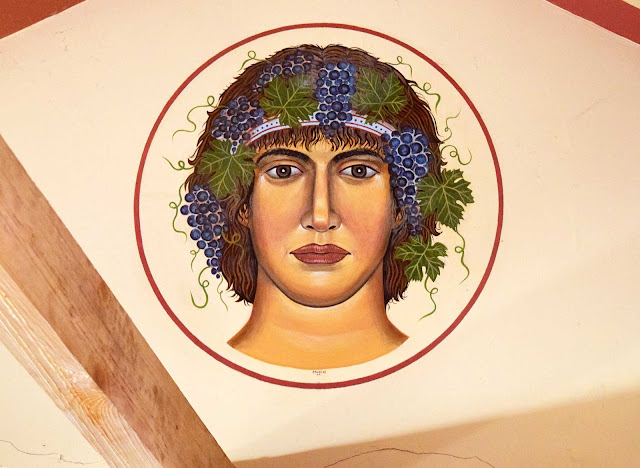Our last days in Greece, where we tasted some wines in Nemea, the area which, we were told, is exciting major wine writers worldwide. Wine has been grown in this area dating back to at least the 5th Century BC. Modern winemaking started just 50 years ago. It is probably Greece's most important red wine appellation. Agiorgitiko is Nemea's native grape variety, and is named for the small St George's Church found within the boundaries of the appellation: agiorgitiko translates as 'St George's grape'. And yes, they do have the dragon legend
We
started where, apparently, it all started, at Papaioannou wines. Modern Greek
wines that is. Most of the wine we had been drinking from the carafes at La
Petite Planete came from here. Thanasis Papaioannou is one of the first
producers who understood and promoted the idea that the wine must maintain its
unique characteristics. On this 57 hectare vineyard of organically grown
grapes, his son George, a chemist, produces wine from Agiorgitiko, Cabernet
Sauvignon, Roditis, Assyrtiko, Chardonnay, Pinot Noir, Syrah, Merlot, Touriga,
Roussanne, Sauvignon Blanc,& Petit Verdot
Some of the wines they sell
And more, they have a large US market
Their prices in Euros per bottle and
per case
There was a lot of wine on offer for
tasting
We tried to limit our tasting to wines
made with grapes we were unfamiliar with and their best selection. The St
George won a Gold Concours Mondiale medal in 2008 and we scored it very
highly. It is full of perfect cassis in layers with soft chalky tannins and
wood
The wines were initially quite
uncomplicated, the whites had a lot of pinking and some good aromas, but some
are rather astringent on the palate. But we do not know how long the bottles
had been open. The 2005 Petit Verdot, in oak for 2 years, has a bruléed
savoury nose and there is a nice development of good fruit with long after
flavours
The 2014 Assyrtiko had elegance and an
interesting nose, a full mouth of smooth layers of fruit. It reminded Lynne of
a Semillon Chardonnay blend. A food wine
It's a small but familiar looking wine
cellar
We were delighted to meet Thanasis
Papaioannou, introduced to us by Vassiliki of La Petite Planete. His son now runs
the business, but he is still involved
A fine wine logo
Just down the road is Palivou Estate
Winery. This is the one people are talking about, and rightly so. It is owned
by winemaker George Palivos and his wife Aggeliki Palivou
Their sign
We were welcomed by 25 year old
winemaker daughter Evangelia Palivou who trained at Burgundy in France. The
estate consists of more than 300 stremmas (area equal to 1000 sq meters)
planted mostly with Agiorgitiko (St George), but also with Rodites, Malagousia,
Chardonnay, Merlot, Cabernet Sauvignon and Syrah
She showed us some of the vineyards
and explained that they have very varied terroir and climates, as the vineyards
start in the valley and then climb up the hill.
Also olives
and very high vineyards
The ground is very stony and dry
In the 300 barrel cellar, they use
French and American oak
Dionysos
Nice wall murals
A selection of their wines
The tasting room, where we tasted
through the available wines. We were very impressed with the quality and depth
of these wines. Memos, a white wine made from 70%
Roditis and 30% Moschofidero, has a floral muscat nose and is crisp, limey and
slightly spritzy, long and fresh. They blend Chardonnay with Malagouzia in the
Stone Hills white; it's an easy drinking delicate wine with a lees character,
with minerality and pineapple. We were very impressed with their Viognier;
peaches and apricots with a whiff of smoke, very elegant and delicate with
white peaches and jasmine on the palate
Their current wine list. The Vissino
rosé has a blue tinge, it's like meaty cherries on the nose, and a sweet cherry
aid with good acids, delicate and nuanced on the palate. Their best seller
Anemos Red, made entirely from St George, is dark as Claret, full of elegant
cassis violets and on the palate cherries, raspberries and other berries. It’s
soft with no faults and a long finish so you can see why it is so popular. From
then on, the reds just got better and better, more sophisticated, longer
lasting and interesting. The top wine is Palivou Nemea Nohma G. Palivos and is
a blend of wine made in 2007 & 8. Only 700 bottles are made from 60% St
George, 23% Cabernet and 17% Syrah. Black garnet with red edges. Expensive
wood, blackberries, cassis, vanilla and violets give it elegant and expensive
notes. On the palate cassis with hot spice and weighty acidity to make it last
It was a really good tasting for which
we were very grateful. Evangelia's English is perfect and she understood that
we wanted to know more about the wine, the estate and the area than most people
would. We came away with three bottles of their wine to taste back home
Time for a late lunch in another
taverna. You can see the photographer
The faded menu. We had toasties
A view of the high street in Mycenae
And for supper, to round off another
good meal and a great last day, a lovely dessert. And then an early night,
because the next day would be all about moving on towards the airport and then
the flight home
Return to MENU
© John & Lynne Ford, Adamastor & Bacchus 2015






























No comments:
Post a Comment